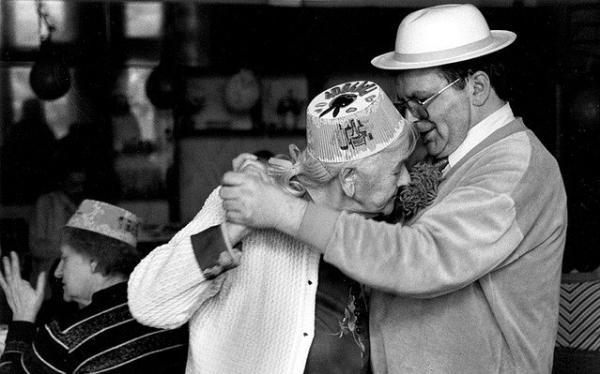The phenomenon of an aging population tends to be analysed through an economic lens and the issue of care for the elderly is often used as a political football. But how often do we step back and think clearly about our hopes and expectations for old age? Jesuit theologian, Edward Vacek puts forward a positive vision for the Christian life of the elderly, in which the most important activity is love of others, self, and especially God.
It has been postulated that someone, somewhere in the world, has already been born who will live to be 150. Scientists predict that over half the persons who are born today will live past the 100 year mark. Whatever the truth of these prognostications, it is already true that people are living longer and longer. In Jesus’s time, the average life lasted perhaps 35 to 40 years, and the same was true as recently as 1850. One hundred years later, that rose to 65 years; now in countries like Britain the average is 80 years. As people lived longer and longer, contemporary societies encouraged a stage in life called ‘old age’ or ‘retirement’.
While a few people in every era have lived very long lives, the present era of unprecedented longevity for most people presents social problems that the human race has never before faced. One social question, of course, is how, economically, to accommodate and support so many older persons, especially when their numbers are predicted to double in the first 30 years of this century. I want to take up a different, quite unresolved philosophical and religious question: what is the purpose of these years? As aging makes ever deeper inroads into personal, interpersonal and societal life, what hopes and expectations should we have for seniors? Do we think that a 65-year-old should take their leave of the workforce to make way for younger people? Should an 80-year-old, if still fit in mind and body, be expected to work a full week? Or should we affirm the current pattern of no set expectations, allowing everyone to do whatever they want, as long as they can finance their choices? The old of today, by the way they live, are social experiments exploring retirement models for the future.
One stark way of dramatising the issue would be to ask: would it be appropriate for a Christian to decide to use these post-retirement years as a 20-year vacation? That is, should a Christian aspire to two decades of what the dictionary describes as a period of ‘pleasure, rest, and relaxation’? Should a ‘vacation’ that is ordinarily an intermission in life become the mission or, better, the non-mission of this stage in life? Would it be ethical if today’s youth aspire to take a 30-35 year vacation at the end of their life, not to mention the 85-year vacation for the person who supposedly will live to 150? It would be reassuring if for Christians these were merely rhetorical questions, eliciting the obvious answer that, ‘No, that is not what life is all about.’ Contemporary culture, however, typically provides no compelling social imagery for retirement. Without stronger social expectations, the results for all too many people are days and nights filled with TV dinners and TV shows, bread and circuses to occupy the elderly.
Few Christians would dispute that childhood is for progressing ‘steadily in wisdom and age and grace’ before God and other people (Luke 2:52). Most Christians agree that the majority of adulthood is a time for growth in prudence and love while devoted to production and reproduction in the form of work and family life. In setting such social expectations we do no injustice to those adults who, for various reasons, are unable to marry or work.
If, however, an able-bodied person, supported with a large inheritance, decided to do little but eat, drink and be merry, the vast majority of us would not consider this to be a fruitful life. For Christians, both of the two great commandments intervene to ask, ‘where is the love for God and where is the love for neighbour’? Probably, we would also hear a third commandment protesting, ‘where is love of self?’ Each person has talents, and these should not be buried. True happiness requires work and love, as Freud claimed, as well as reflection and contemplation, as Aristotle and Aquinas argued.
What is old age for? Did Macbeth get it right?
To-morrow, and to-morrow, and to-morrow
Creeps in this petty pace from day to day,
To the last syllable of recorded time;
And all our yesterdays have lighted fools
The way to dusty death. Out, out, brief candle!
Life's but a walking shadow, a poor player
That struts and frets his hour upon the stage
And then is heard no more: it is a tale
Told by an idiot, full of sound and fury,
Signifying nothing. (Act 5, Sc. 5).
The typical retirement age in Britain is 65. But chronological age no longer is a good proxy for expected contributions or needs. For example, those who have done back-breaking and lung-congesting work in coal mines presumably need surcease long before those who have worked at air-conditioned health spas. Thus, for particular individuals, the primary criterion of aging is autobiographical. Still, no one’s autobiography is intelligible, even to themselves, without a larger narrative of how they contribute to, take from, or step outside society. And it is here where current Western culture and Christianity fail the aging.
If one no longer has a role in society, then society can no longer provide one’s reason to live. The increased acceptability of euthanasia is only a short step away. The book of Proverbs exclaims that without prophetic vision, ‘the people cast off restraint’ and become demoralised (29:18). But what vision? Many gerontologists, under the influence of individualism, affluence and secularism, encourage retirees to enjoy to the hilt their new found release from responsibilities. Their message is a far cry from that of Christianity in the past which encouraged the elderly to practise resignation, self-sacrifice and religious trust.
What virtues should Christians today recommend?[1] Almost any answer inevitably lists virtues that are true for every phase of our responsible lives. But, while the words stay the same, the melody changes. For example, courage on the battlefield is quite different from courage facing death at the end of life; that is, courage before the avoidable and courage before the inevitable are different. Religious conviction likewise modifies the virtues. Courage is different in atheists who hold the stoic view that death itself is nothing to worry about since, once dead, they will not exist and thus nothing can ever hurt them. Christians, at least until recently, needed courage to advance toward a death that was thought to be followed ordinarily by purgatory if not by everlasting hell fire, although contemporary Catholics often speak and act as if they should not need courage since they are confident that an all-loving and all-forgiving God stands ready to give them instantly an eternity of happiness.
In the interest of brevity, let me consider only the most basic Christian virtue in its most general forms: our loves for God, neighbour, self and world.[2] Exercising these loves is the main point of life, including the time of old age retirement. I take these loves in reverse order, beginning with love for the world.
Although the elderly vary greatly, many have sufficient if not also significant amounts of resources. After working for many decades, most seniors will be tempted to think that they have earned independently whatever they have and that therefore in justice they can do with these resources as they please. Some oldsters become what, pejoratively, have been called the ‘greedy geezers.’ They use their time, talent, treasure and, importantly, their vote almost entirely to enhance their own retirement years.
A Christian understanding is different. All our resources and successes depend, fundamentally, on God and, thereafter, on an endless number and variety of other people both in our lifetime and in the countless years that preceded us. We belong to the ‘world-stream’ which includes, beyond the human race, the ecology of the earth. Not only out of gratitude but also out of love we should care for the world’s future. As noted ethicist Daniel Callahan has argued, ‘the primary aspiration of the old . . . is to serve the young and the future. Just as they were once the heirs of a society built by others, who passed on to them what they needed to know to keep going, so are they likewise obliged to do the same for those who follow them.’[3] This aspiration is not simply an optional activity but an ethical requirement of love for the world. Elderly Christians are called to a kind of agape love (selfless or altruistic love) since, due to the shortness of their remaining time, they may reap no earthly gain when they mend fences generously and sow seeds for younger generations.
Love of self also takes on new meanings in old age. If youth is a sketch book of possibilities, elderhood refers to the chapters that make up its denouement. Among the new challenges for self-love will be an increasing need to deal with medical and psychological issues, including loss. More positively, self-love in the elderly should include fulfilling some long-deferred dreams as well as exploring some new activities. These might include travel, gardening, literature, church groups, community affairs, not to mention new types of prayer.
Love of neighbour may also take new forms as we enter old age. Of course, in gospel terms, one’s neighbour refers to everyone, including the stranger and the outcast. Here I use the term to mean those people with whom the elderly interact in a more direct way. ‘Neighbours’ are now likely to include care-givers, those who assist the elderly with medical help, with transportation, or through minor courtesies and major accommodations. One recent significant development in neighbourliness takes the form of mutual assistance organisations. In any population of senior citizens, both needs and resources can be great. Underlying any service that people of similar ages offer one another is human interaction, indeed friendship, which is essential for everyone and especially poignant among those who have weathered together the storms of history.
The most important activity at any age is to love God. Love for God should not be confused with love for neighbour or for self, even though there are important connections among these loves. This love, much as the other loves, has different emphases as we move into and through old age. Much of life can be described as our cooperating with God in building God’s kingdom ‘on earth as it is in heaven.’ In addition, we should have developed through prayer an ongoing friendship with God. Old age will, as the years progress, more and more turn this relationship into that of ‘old friends.’ Petitionary prayer may represent all that we can ‘do’ for others. Prayer for forgiveness may be all that we can offer to make up for harm we have done. Prayers of gratitude for all that we have received can be a way to do in a religious context what secular gerontologists and psychologists recommend, namely, a review of life through which we appropriate and confirm who we have become.
For most of their retirement, the elderly are not at death’s door, but that door is no longer in another building. Gradually, in Julian of Norwich’s memorable phrase, prayer has to turn into the quiet hope that, whatever the past or present, ‘all shall be well, and all manner of thing shall be well.’ Finally, this leads, usually in fits and starts, more towards Jesus’s prayer: ‘Into thy hands, I commend my spirit’ and, eventually, ‘It is finished.’
Edward Collins Vacek SJ is Stephen Duffy Professor of Theology at Loyola University, New Orleans.
[1] See Edward Vacek SJ, ‘Vices and Virtues of Old-Age Retirement,’ Journal of the Society of Christian Ethics 30 (2010): 161-82.
[2] Edward Vacek SJ, Love, Human and Divine (Washington, DC: Georgetown University, 1994).
[3] Daniel Callahan, Setting Limits (New York: Simon & Schuster, 1988), p. 43; the irony, of course, is that Callahan, who grew up deeply influenced by Catholicism, was in fact an atheist when he urged such high Christian ethical ideals.






